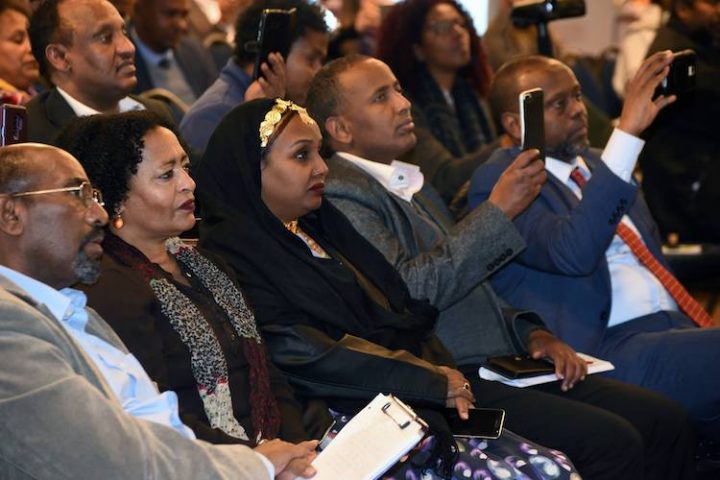By Ramesh Jaura
BRUSSELS (IDN) – When the Eritrean President Isaias Afwerki and Ethiopian Prime Minister Abiy Ahmed signed in July a peace deal after two decades of war and ensuing violent border clashes, “a new era of peace and friendship” was felt to have begun in the Horn of Africa comprising Djibouti, Eritrea, Ethiopia, and Somalia.
Six months on, African leaders and close observers of the situation in the region, attending the Eritrean diaspora conference in Brussels, have expressed grave concern that “peace and friendship” have yet to dawn on relations between the government in Asmara and Eritreans.
Despite rapprochement between the two Horn of Africa countries, Eritreans continue to flee their country in record numbers, crossing the border to Ethiopia. According to Eyob Ghilazghy, a prominent journalist and human rights campaigner, Eritreans are crossing into Ethiopia and seeking asylum at the rate of 350 to 600 per day.
Eritrean refugees tell Ghilazghy, “The situation in Eritrea is very dire. The indefinite national service is still fully in place and living conditions have worsened.”
Abrahalei Tesfai, a spokesperson for Eritreans who like many of his countrymen passed through Libya and now lives in in Italy, continues to receive desperate calls from Eritreans about the situation of their relatives left without any hope in Libya.
“I have seen horrific footage from Libya, of emaciated Eritrean refugees, starved, denied medical care, tortured, repeatedly abducted and held for ransom for thousands of euros,” says Tesfai, adding: “They must be evacuated immediately” with the help of the EU.
Around ten thousand Eritrean refugees are reported to be languishing in “death camps” in Libya, while thousands of euros are being collected by the diaspora to free them.
The December 12-14 Brussels Conference attended by some 200 representatives of the Eritrean diaspora, is significantly titled “We the People: Peace in the Horn & the Safety and Future of the Eritrean People”.
Nearly 40,000 people are reported to have fled Eritrea last year, “escaping a government notorious for one of the worst human rights records in the world and for condemning citizens to lifetimes of mandatory military service,” which the government introduced for an indefinite period of time following the 1998-2000 war with Ethiopia.
The war cost the countries an estimated 100,000 lives, while conscription created a generation of Eritrean refugees. The UN Refugee Agency UNHCR said that in 2016 there were 459,000 Eritrean exiles out of an estimated population of 5.3 million.
The Brussels Conference has asked for the EU’s help to evacuate Eritrean refugees in Libya and resettle and protect them.
Opening the Conference, Chief Fortune Charumbira of Zimbabwe, the Vice-President of the Pan-African Parliament, also known as the African Parliament, said:
“… I have listened to many refugees, it has been shocking to hear their stories. Their testimonies reveal modern-day slavery in Africa.
“Heart-breaking and horrific stories that I have been hearing here are totally a reflection of the violation of human rights of highest order. We need to do all in our power to stop slavery on the African continent.”
Representatives and supporters of the Eritrean diaspora are concerned that early next year, the Eritrean government will take over the chair of the key Africa and European Union (EU) forum dealing with African migration known as the Khartoum Process, established in the Sudanese capital in 2014.
“It’s had little public profile, yet it’s the most important means Europe has of attempting to halt the flow of refugees and migrants from Africa,” says Martin Plaut, Senior Research Fellow, Horn of Africa and Southern Africa, Institute of Commonwealth Studies, School of Advanced Study.
He adds: “The official title says it all: The EU-Horn of Africa Migration Route Initiative. Its main role isspelled out as being: primarily focused on preventing and fighting migrant smuggling and trafficking in human beings.”
The Chair of the Khartoum Process alternates between European and African leaders. In January it will be Africa’s turn. The steering committee has five African members – Egypt, Eritrea, Ethiopia, South Sudan and Sudan. A number of others nations, such as Kenya to Tunisia, have participating status.
“The African countries chose Eritrea to lead this critical relationship. But it’s been heavily criticised because it places refugees and asylum seekers in the hands of a regime that is notorious for its human rights abuses. Worse still, there is evidence that Eritrean officials are directly implicated in human trafficking the Khartoum Process is meant to end,” notes Plaut.
“That the European Union allowed this to happen puts in question its repeated assurances that human rights are at the heart of its foreign policies,” he adds.
“We are concerned that to fight human trafficking, more EU funding will be approved … for countries such as Eritrea whose highest officials are linked to the practice [of human trafficking],” says International Relations Professor Mirjam Van Reisen of Tilburg University. This, she says, is a rather “cynical policy,” and adds: “The EU must stop financing those benefitting from human trafficking.” [IDN-InDepthNews – 13 December 2018]
More information is available on Facebook.com/asmara.eritrea.50702, @EritreaPress, #ChangeinEritrea and through Email: Eritreapress@gmail.com
Photo: A glimpse of Brussels conference participants. Credit: Eritrea Press
IDN is flagship agency of the International Press Syndicate.
facebook.com/IDN.GoingDeeper – twitter.com/InDepthNews
Send your comment: comment@indepthnews.net






